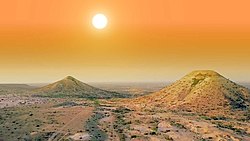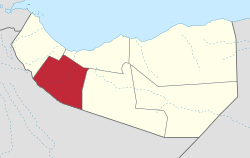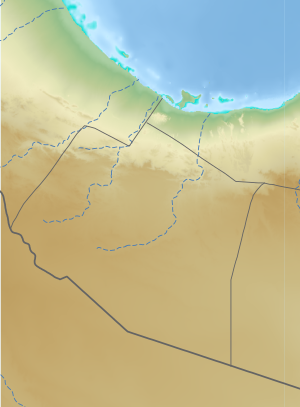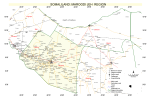Maroodi Jeex
Marodi Jeh
| |
|---|---|
 Naasa Hablood mountains in the outskirts of Hargeisa | |
 Location in Somaliland | |
| Coordinates: 6°6′47″N 47°59′17″E / 6.11306°N 47.98806°E | |
| Country | |
| Administrative centre | Hargeisa |
| Government | |
| • Governor | Mohammed Ahmed Alin |
| Area | |
• Total | 57,429 km2 (22,173 sq mi) |
| Time zone | UTC+3 (EAT) |
| HDI (2021) | 0.653[1] low · 1st of 6[2] |
Marodi Jeh (Somali: Maroodi Jeex, Arabic: مرودي جيح) is an administrative region (gobol) in western Somaliland.[3] It is the most populous region of the country. It is bordered by Awdal to the west, Sahil to the north, Togdheer to the east and Ethiopia to the south. Marodi Jeh was created by splitting the previously existing region (gobolka).[4][5] In 2007 the region of Woqooyi Galbeed was renamed to Maroodi Jeex.[3]
Etymology
[edit]The Marodi Jeh region (meaning "split elephant" in Somali) corresponds with the historical name of the Tog Maroodi Jeex, a seasonal river that flows through the region during the rainy season:
Hargeisa is situated on the Tug Marodijeh, the banks of which are well wooded, and as it can boast of an excellent climate all the year round, and is about half-way on the main route from Bulhar to Jig-jigga on the Abyssinian frontier, it is always likely to be of some importance to caravans. A large percentage of the trade from Ogadayn passes through it to Bulhar on the coast.[6]
History
[edit]Formerly known as the Hargeisa District, it was one of six districts that made up the British Somaliland protectorate. In 1960, the then independent State of Somaliland merged with Italian Somaliland to form the Somali Republic. By 1964, the then Hargeisa District merged with the Borama district (now Awdal) and the Berbera district (now Sahil) to form the Woqooyi Galbeed region (literally North West, also known as Hargeisa region).
Borama district (now Awdal) was carved out of the western parts of Woqooyi Galbeed region in June 1984.[7] When the Somali Civil War broke out, the former British territory declared the revival of the pre-independent State of Somaliland.[8] In 1991 Berbera district (now Sahil) was carved out of the northern parts of Woqooyi Galbeed region.
In 2007 the region of Woqooyi Galbeed was renamed to Maroodi Jeh (Chapter 1, Article 2 [23]. ]).[3]
Overview
[edit]Marodi Jeh is bordered by Ethiopia to the south, the region of Awdal to the west, and Togdheer to the east. Its capital is Hargeisa. It is known to be a very strategic region with rich farmlands and large ports.[9] It also contains the town of Toon, the traditional seat of the Isaaq Sultanate.[10]
Demographics
[edit]According to the Somaliland Ministry of National Planning, Marodi Jeh har a population of 1.1 million in 2014.[11]
Marodi Jeh is inhabited by people from the Somali ethnic group, with the Arap, Ayub,Habr Garhajis, Habr Awal and Habr Je’lo clans of the wider Isaaq clan-family.[12][13][14][15][16][17][18][19][20]
Districts
[edit]Under the 2002 law, the Marodi Jeh region was divided into four major and six minor districts.[21]
- Hargeisa District (A)
- Gabiley District (A)
- Baligubadle District (C)
- Salahlay District (C)
- Faraweyne District (D)
- Sabawanaag District (D)
- Adadley District (D)
- Daarasalaam District (D)
- Allaybaday District (D)
- Da'ar buduq District (D)
Under the 2019 law, the Marodi Jeh region was divided into four major and six minor districts.[22]
- Hargeisa District (A)
- Gabiley District (A)
- Baligubadle District (C)
- Salahlay District (C)
- Faraweyne District (D)
- Sabawanaag District (D)
- Adadley District (D)
- Daarasalaam District (D)
- Allaybaday District (D)
- Bali-Matan District (D)
- Laas Geel District (D)
- Wajaale District (D)
- Agabar District (D)
- Ged-Baladh District (D)
- Arabsiyo (D)
- Dacarta District (D)
- Gumburaha District (D)
- Saylab-barri District (D)
- Bali-cabane District (D)
Map
[edit]- Map of Maroodi Jeh Region
See also
[edit]- Administrative divisions of Somaliland
- Regions of Somaliland
- Districts of Somaliland
- Somalia–Somaliland border
References
[edit]- ^ "Sub-national HDI - Area Database - Global Data Lab". hdi.globaldatalab.org. Retrieved 2018-09-13.
- ^ Including Saaxil
- ^ a b c Republic of Somaliland (2007). "REGIONS & DISTRICTS LAW: LAW NO: 23/2002 AS AMENDED IN 2007". Retrieved 2022-12-10.
- ^ Regions of Somalia
- ^ "Somalia". The World Factbook. Langley, Virginia: Central Intelligence Agency. Retrieved 6 December 2013.
- ^ Drake-Brockman, Ralph Evelyn (1912). British Somaliland. Hurst & Blackett. p. 67.
- ^ "Somalia Regions".
- ^ "Somaliland profile". BBC News. 2016-05-26. Archived from the original on 2017-04-23. Retrieved 2017-04-23.
- ^ "WoqooyI Galbeed – Situation Analysis, October 2012 - Somalia | ReliefWeb". Reliefweb.int. Retrieved 2022-09-01.
- ^ The Transactions of the Bombay Geographical Society 1850, Volume 9, p.133
- ^ United Nations Office for Somalia, (UNDOS) (1997). "WAQOOYI GALBEED AND SAHIL". Archived from the original on 2001-06-30.
- ^ Anatomy of Violence: Understanding the Systems of Conflict and Violence in Africa, Belachew Gebrewold.
- ^ Lewis, I. M. (1999). A Pastoral Democracy: A Study of Pastoralism and Politics Among the Northern Somali of the Horn of Africa. James Currey Publishers. p. 109. ISBN 9780852552803.
- ^ Dostal, Walter (2005). Shattering Tradition: Custom, Law and the Individual in the Muslim Mediterranean. p. 296.
- ^ Lewis, I. M. (1 January 1999). A Pastoral Democracy: A Study of Pastoralism and Politics Among the Northern Somali of the Horn of Africa. James Currey Publishers. pp. 109. Gadabuursi in the region of Gebile/Gabilay (Woqooyi Galbeed). ISBN 9780852552803.
- ^ Dostal, Walter; Kraus, Wolfgang (22 April 2005). Shattering Tradition: Custom, Law and the Individual in the Muslim Mediterranean. I.B.Tauris. p. 296. ISBN 9780857716774.
- ^ "Countries that aren't really Countries".
- ^ A Bellagamba (2008) Bellagamba, Alice (2008). Beside the State: Emergent Powers in Contemporary Africa. R. Köppe. ISBN 9783896452542.
- ^ Mouton (1997) "Cahiers d'études africaines". 1997.
- ^ Karthala (n.d) POLITIQUE AFRICAINE 50 La Corne de l'Afrique. KARTHALA Editions. ISBN 9782811101442.
- ^ See: TheSomaliland Region and Districts Law, Law No: 23/2002 as amended in 2007, article 6.1.
- ^ "Wax Ka Beddelka iyo Kaabista Xeerka Ismaamulka Gobollada iyo Degmooyinka Xeer No: 23/2019" [Amending and Supplementing the Law on Self-Government of Regions and Districts Law No: 23/2019] (PDF). Somaliland. 2019. Retrieved 2024-07-26.
External links
[edit]![]() Maroodi Jeex travel guide from Wikivoyage
Maroodi Jeex travel guide from Wikivoyage


